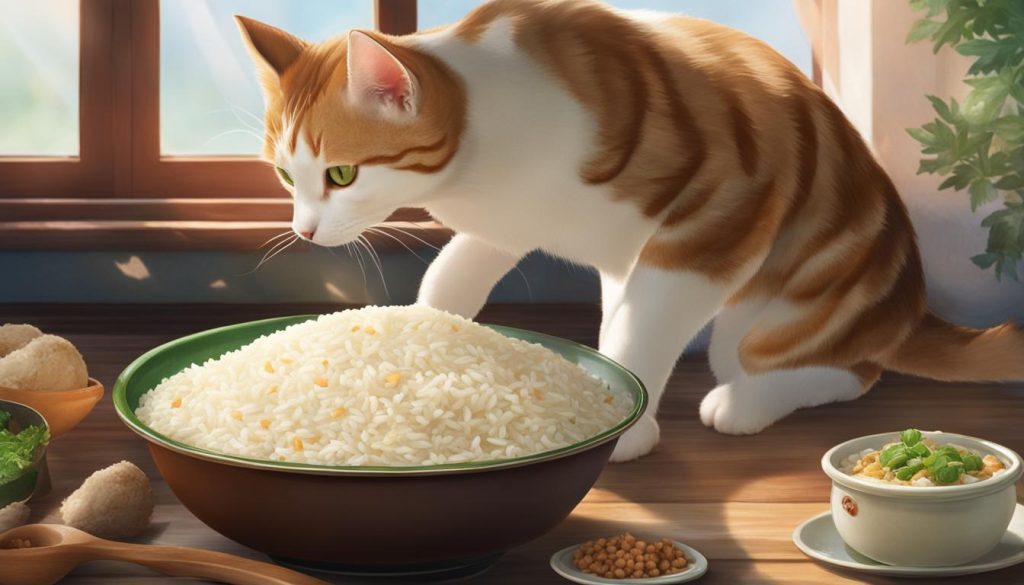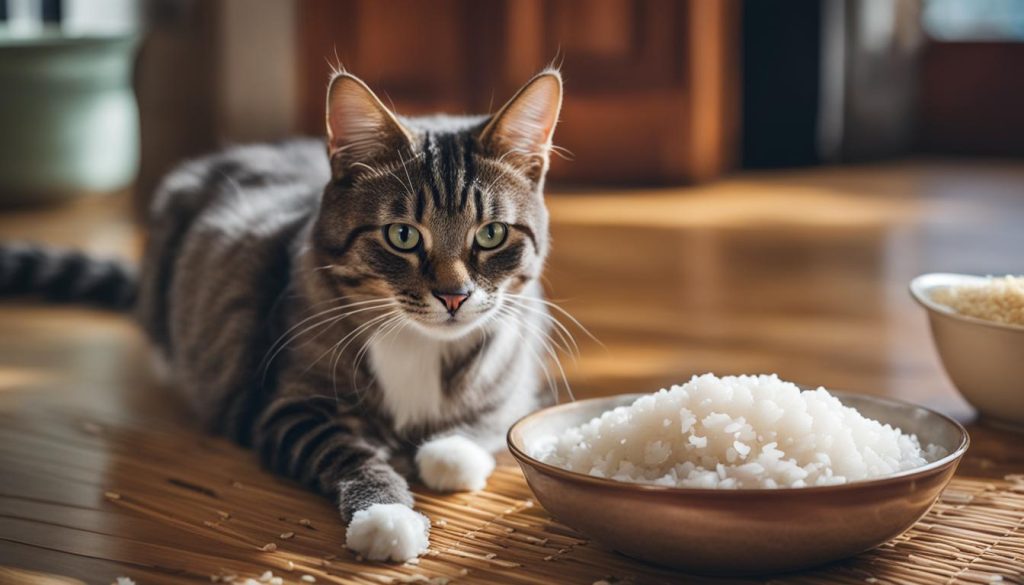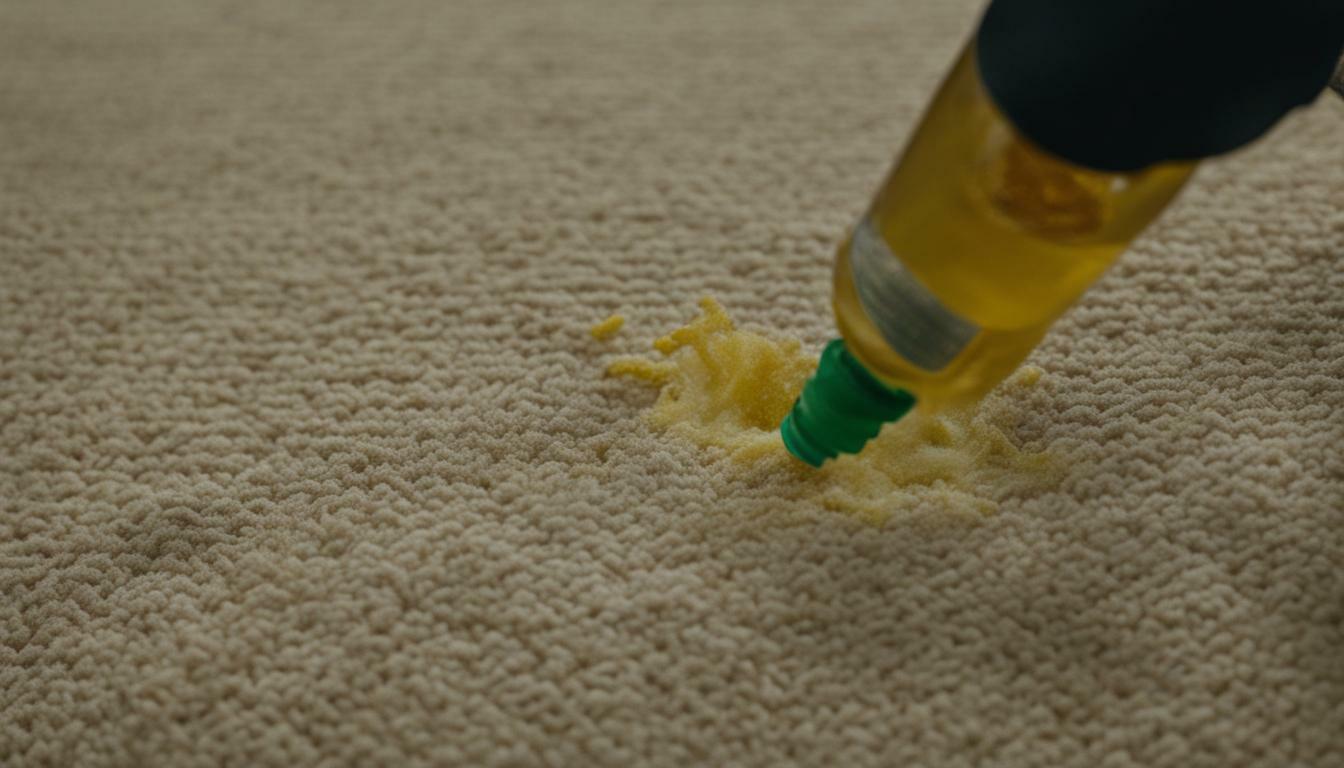When it comes to our feline friends, providing a nutritionally balanced diet is essential for their overall health and well-being. As cat owners, we often wonder whether certain human foods, such as rice, can be safely incorporated into their diets. In this article, I will shed light on the topic and answer the question: Can cats eat rice?
Cats are obligate carnivores, meaning their bodies are designed to thrive on a diet mainly consisting of animal proteins. While their digestive systems lack the enzymes necessary to process vegetables and fruits effectively, the addition of some safe, human foods can provide a nutritional boost. But where does rice fit into the equation?
Can Cats Eat Rice? Yes, they can – as a rare treat.
- Rice can be safely consumed by cats, but it should only be given in small amounts and on an occasional basis.
- Whole sources of protein, like chicken, turkey, eggs, or fish, should form the bulk of a cat’s diet.
- Cats should avoid rice if they have difficulty digesting new foods or if they’re at risk of kidney failure.
- Rice should be cooked thoroughly, served unseasoned, and free of any ingredients that can be toxic to cats.
- Consult with a veterinarian to ensure that your cat’s nutritional needs are being met and for guidance on incorporating rice or alternative options into their diet.
Cats and Human Food: What Can Cats Safely Eat?
While cats are primarily meat eaters, there are some human foods that can be safely shared with them in moderation. Lean meats like beef, chicken, turkey, liver, and lamb are okay for cats to eat, as long as they’re cooked thoroughly and free of skin and bones. Fish is another option, as it contains beneficial omega-3 fatty acids. Eggs, either scrambled or boiled, can provide cats with amino acids and protein. Whole grains like oats, corn, brown rice, and couscous can also be included in a cat’s diet, but in moderation.
When it comes to fruits and veggies, most cats don’t have a preference for them, but safe options include cucumbers, steamed broccoli, carrots, asparagus, bananas, blueberries, cantaloupe, and deseeded watermelon and apples.

Note: Always remember to introduce new foods gradually and watch for any adverse reactions in your cat, such as vomiting or diarrhea. If your cat has any underlying health conditions or dietary restrictions, it’s best to consult with your veterinarian before introducing new human foods into their diet.
Is Rice Safe for Cats?
Many cat owners wonder whether rice is safe for their feline friends. The answer is yes, but with a few important considerations.

Rice can be safely included in a cat’s diet, but it should not be a staple food or replace meat. Cats are obligate carnivores, meaning they require animal protein for optimal health. However, rice can be given occasionally and in small amounts.
When feeding rice to cats, it’s essential to cook it thoroughly and serve it plain, without any seasonings. Both white rice and brown rice can be consumed by cats, but brown rice contains higher fiber content, making it slightly more difficult to digest compared to white rice.
It’s important to note that while rice can be safe for cats, it is not an essential part of their diet. Cats derive most of their nutritional needs from animal proteins, and rice should only be considered as an occasional treat or supplement. A well-balanced cat diet should primarily consist of high-quality, whole sources of protein like chicken, turkey, fish, or eggs.
Remember to consult with your veterinarian before introducing any new foods to your cat’s diet, including rice. Your vet can provide personalized advice based on your cat’s specific needs and dietary requirements.
When Should Cats Avoid Rice?
While rice is generally safe for cats, there are some situations in which cats should avoid consuming it. Some cats may have a hard time digesting new foods, and rice can cause gastrointestinal issues and vomiting. Cats who consume a lot of rice are also at risk of kidney failure, as rice does not provide essential amino acids like taurine that are found in animal protein. Additionally, cats may experience malnutrition if they fill up on rice and neglect their meat-based nutrition. Uncooked rice is not safe for cats to eat and can cause digestive issues. Rice should also be served unseasoned and free of ingredients like onions and garlic, which can be toxic to cats.
How to Safely Include Rice in Your Cat’s Diet
If you choose to include rice in your cat’s diet, it should be done sparingly and with caution, following the guidance of your veterinarian. Safely feeding rice to cats involves a few important considerations to ensure the well-being of your feline friend.
Firstly, it’s crucial to cook the rice thoroughly before serving it to your cat. Whether you opt for white or brown rice, make sure it is fully cooked to aid in digestion. Additionally, avoid seasoning the rice with any additives, as cats should not consume spices or artificial flavorings.
When incorporating rice into your cat’s diet, keep in mind that it should only constitute a small portion of their overall calorie intake. Grains like rice should make up no more than 25% of their daily caloric intake, with the majority of their nutrition coming from meat-based products. This ensures a balanced diet that meets their natural dietary needs as obligate carnivores.
Consulting with your veterinarian before introducing rice as a cat food supplement is essential. They will provide personalized advice based on your cat’s specific nutritional requirements and any pre-existing health conditions.
In some cases, rice can be beneficial to cats experiencing diarrhea. Adding rice to their diet can help add bulk to their stool and aid in digestion. However, it is important to note that there are other options and remedies for managing diarrhea in cats, and seeking veterinary guidance is recommended to determine the best course of action.
Remember, every cat is unique, and their dietary needs may vary. Always follow your veterinarian’s recommendations and closely monitor your cat’s response to any dietary changes, including the inclusion of rice in their meals.
Rice Alternatives for Cats
If you prefer not to feed your cat rice or are looking for alternative options, there are other human foods that can be safely given to cats. Plain chicken, lamb, lean deli meats, liver, and beef are good sources of protein. Cooked eggs, fish like tuna and salmon, and certain vegetables like broccoli, carrots, pumpkin, and squash can also be included in a cat’s diet in moderation. Always make sure any human food you give to your cat is unseasoned and free of ingredients that can be toxic to them, such as onions, garlic, and sugar.
FAQ
Can cats eat rice?
Yes, cats can safely eat rice, but it should be given in small amounts and only occasionally. Rice should be cooked thoroughly and served unseasoned.
Is rice safe for cats?
Rice is generally safe for cats to consume, but it should not replace meat in their diet. Cats require animal protein for optimal health.
When should cats avoid rice?
Cats should avoid consuming rice if they have difficulty digesting new foods or if they consume a lot of rice, as it can cause gastrointestinal issues and potentially lead to kidney failure.
How to safely include rice in your cat’s diet?
Rice should be served sparingly and only if recommended or needed by your veterinarian. It should be cooked thoroughly, served unseasoned, and make up no more than 25% of your cat’s total daily calorie intake.
What are some rice alternatives for cats?
If you prefer not to feed your cat rice or are looking for alternative options, you can consider plain chicken, lamb, lean deli meats, liver, beef, cooked eggs, fish like tuna and salmon, and certain vegetables like broccoli, carrots, pumpkin, and squash.






